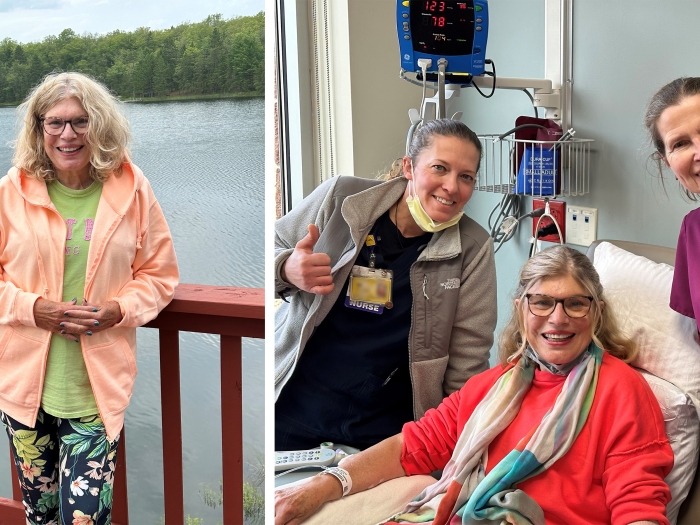Complex colon polyps have traditionally meant surgery. But now, experienced GI physicians can remove them with a colonoscopy.
7:00 AM
Author |

The presence of polyps — abnormal, precancerous growths in the colon — doesn't necessarily mean you have cancer. But if they're not removed, that risk exists.
MORE FROM MICHIGAN: Sign up for our weekly newsletter
So when it comes to removing complex colon polyps, patients and their doctors must make a choice: polyp extraction via colonoscopy or invasive surgery.
"The discussion should revolve around the risks and benefits of both options," says Anoop Prabhu, M.D., a clinical lecturer in gastroenterology at Michigan Medicine. "There are issues associated with each option."
Both methods bear similar recurrence rates, he notes, meaning other factors influence the decision.
A larger or hard-to-reach polyp might prompt a clinician to advise surgery for patient safety and the best results. Patient preference or absence of a local doctor trained in polyp removal via colonoscopy also may influence the treatment decision.
In less severe circumstances, the endoscopic route — also known as a polypectomy — could work to reduce medical costs and recovery time, among other things.
One variable that ends the debate: if a biopsy confirms the polyp is cancerous.
"Once cancerous tissue is identified, the conversation is completely different," Prabhu says. "Surgery is still considered the standard of care."
Prabhu, also director of endoscopy for the VA Ann Arbor Healthcare System, shared information that all parties should consider before making a verdict:
Differing methods
Polypectomy can be done via a colonoscope (a thin, flexible tube) by injecting fluid under the polyp to raise it, after which it is removed with a snare. A heat current in the snare cauterizes tissue at the cut to avoid bleeding. With the aid of a sedative, discomfort is minimal for polypectomy recipients.
Surgery, on the other hand, involves small incisions in the abdomen to laparoscopically insert small tools and a camera into the abdomen — which is expanded with carbon dioxide. In some cases, an open surgery is required, necessitating a larger incision into the abdominal wall.
Unlike a polypectomy, part of the colon is removed to ensure all of the polyp and any related cancer is gone. All patients are under general anesthesia for the surgery, which can last a few hours.
Potential complications
Tools used during the endoscopic method present minimal risk of perforations or bleeding. In experienced hands, these complications occurred in only 1 percent of patients, according to a 2015 study published in Gut, an international gastroenterology journal.
SEE ALSO: A Colon Polyp Primer: Know the Types and Your Risk Factors
Surgery also has dangers. In addition to infection at the surgery site or incision, a patient could develop an anastomotic leak, a serious complication caused by sutures failing to hold the incision together. A 2013 study in Digestive Surgery found postoperative complications in one-third of 126 patients surveyed over 10 years.
Varying recoveries
A polypectomy lasts about 30 to 60 minutes and is an outpatient procedure, allowing patients to return home the same day. They should be back to a normal routine as soon as the next day. Patients who undergo an endoscopic removal of a large polyp typically require a surveillance procedure in three to six months to confirm there is no remaining tissue, Prabhu says.
Those who go in for surgery usually will remain in the hospital for about three days, but that can double if complications arise. Another potential hindrance: postoperative ileus, "a natural response to the unnatural insertion of tools into the abdomen and anesthesia, resulting in paralysis of the gut that can require a few days to resolve" Prabhu says.
The takeaway
For noncancerous polyps, the course of action favors endoscopic polypectomy when circumstances permit and expertise is available.
Even still, the dialogue should continue. "As is always the case, having an in-depth discussion with the patient and their family about their available options and the risks and benefits of each is the best approach," Prabhu says.

Explore a variety of health care news & stories by visiting the Health Lab home page for more articles.

Department of Communication at Michigan Medicine
Want top health & research news weekly? Sign up for Health Lab’s newsletters today!





